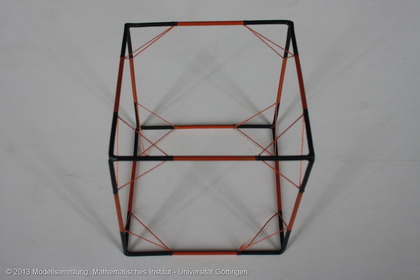Cube with inscribed truncated cube
Model 484
Description
Cube with inscribed (8 + 6) - plane polygon with 8·3 vertices that is polar to the triakis octahedron.
Additions
Cube The cube has six squares as faces. It has eight vertices and twelve edges. At each vertex three squares are meeting.
The cube is one of the five Platonic solids. A Platonic solid is a regular, convex polyhedron. The faces of a Platonic solid are congruent, regular polygons. At each vertex the same number of faces are meeting, see also model 411.
The five Platonic solids are Tetrahedron, Hexahedron (Cube), Octahedron, Dodecahedron and Icosahedron.
Inscribed (8+6)-plane polygon with 8 · 3 vertices The solid inscribed in the cube is a truncated cube. The truncated cube arises from the cube by truncating its vertices. By truncating the vertices eight new triangles are created and the previously existing squares are transformed to six octagons. The truncated cube is circumscribed by
8 triangles + 6 octagons = 14 faces.
It has 8·3 = 24 vertices and 36 edges. At each vertice one triangle and two octagons are meeting (3,8,8).
The truncated cube is one of 13 Archimedean solids, see also 482.
Triakis octahedron The truncated cube is polar (dual) to the triakis octahedron. To create this new solid a sphere is inscribed in the truncated cube such that the sphere touches each of the faces in exactly one point. These points of contact create the vertices of the dual solid. By connecting these 14 vertices 24 triangles are formed. These triangles are the faces of the triakis octahedron. The number of edges remains the same during the transformation into the dual solid, while the number of vertices and faces is exchanged.
There are 11 Archimedean solids in the collection.
| 472 | Truncated tetrahedron | inscribed in a tetrahedron |
| 473 | Truncated octahedron | inscribed in an octahedron |
| 474 485 |
Cuboctahedron | 474 inscribed in an octahedron 485 inscribed in a cube |
| 475 | Truncated cube | inscribed in an octahedron |
| 476 | Rhombicuboctahedron | inscribed in a cube |
| 478 | Truncated icosahedron | inscribed in an icosahedron |
| 479 | truncated dodecahedron | inscribed in a dodecahedron |
| 480 481 |
Icosidodecahedron | 480 inscribed in a dodecahedron 481 inscribed in an icosahedron |
| 482 | Rhombicosidodecahedron | |
| 483 | Snub dodecahedron | |
| 484 | Truncated cube | inscribed in a cube |
The truncated icosidodecahedron and the lost truncated cuboctahedron are not included in the collection.
Showcase of this model is Case number 20
References
Brieskorn, Egbert(1983). Lineare Algebra und analystische Geometrie I, Nachdruck 1985, Vieweg, Braunschweig, p. 19ff.


